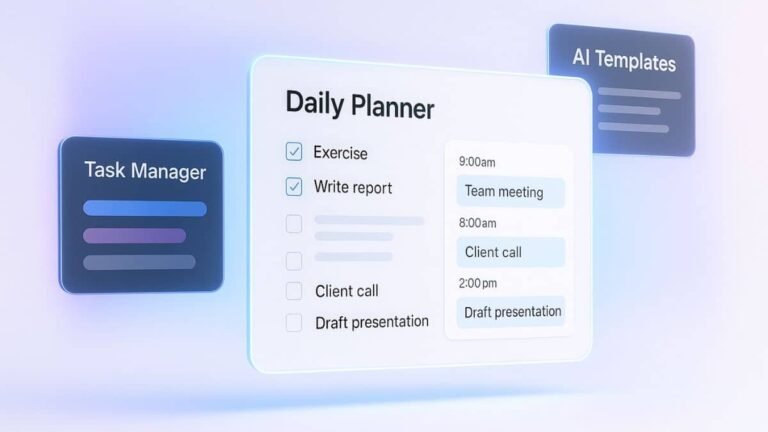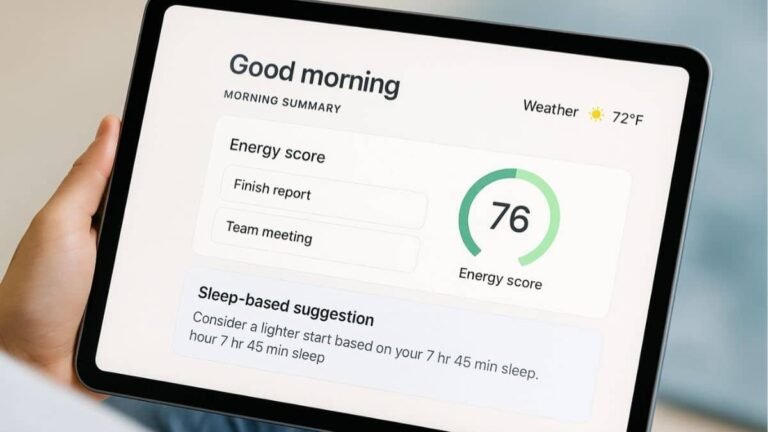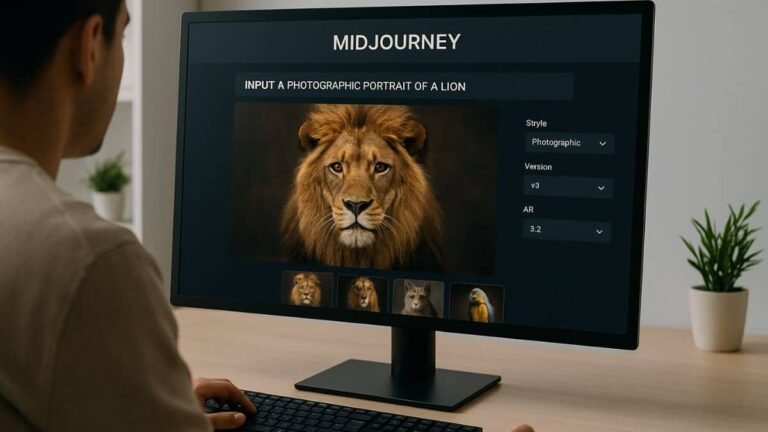Address
251 Little Falls Drive, Wilmington, DE 19808, United States

Feeling overwhelmed by todo lists and time blocks that never work? You’re not alone. Routine planning can feel like a guessing game, unless you let AI take the wheel. In this article, you’ll discover how to simplify your daily routines using smart, intuitive tools. Ready to stop surviving your day and start designing it? Let’s learn how to plan smarter with AI and dive into a disciplined routine that actually works.
Table of Contents
1. Let AI build your schedule dynamically
Let’s be honest: planning your day often feels like a chore. Sticky notes, messy calendars, and dozens of productivity hacks later, you’re still playing catch-up. That’s because traditional planning relies heavily on guesswork. You estimate how long tasks will take. You assume your energy levels will cooperate. But what if your planner actually knew you?
That’s where artificial intelligence (AI) steps in. It’s not just for robots or rocket science anymore. AI is becoming your personal assistant, understanding your behavior, predicting your needs, and helping you build a day that flows with you, not against you.
AI-based planners learn your habits over time, then use that data to fine-tune your schedule. Whether it’s through smart reminders, automated rescheduling, or predictive time blocking, AI quietly optimizes your life in the background.
Platforms like Motion, Reclaim.ai, and Notion AI go beyond simple calendar functions. If you’re just starting out, it helps to explore popular AI tools and how they streamline routines across different productivity needs. They analyze your work style, meetings, and focus patterns to offer suggestions that actually make sense. Over time, your routine doesn’t just become efficient, it becomes intelligent.
One great example is how AI handles changes in real-time. Say your morning meeting gets cancelled, AI doesn’t just leave that time blank. It will slide in another important task you were struggling to fit in. This flexibility makes your routine feel customized and less frustrating.

2. Plan smarter with AI: Design better mornings, breaks, and evenings
Imagine waking up and receiving a smart digest of your day generated by AI, based on your sleep quality, previous day’s workload, and calendar commitments. Apps like Sleep Cycle integrate with AI planners to adjust your start time accordingly. If you had a rough night, your AI planner might gently delay your first deep-work session and frontload lighter tasks.
Midday fatigue hits everyone. AI tools like TimeHero or Clockwise observe your productivity dips and suggest break times when you’re least focused. They recommend tailored break activities like walking or power naps based on your past responses. AI makes those calls smarter. This helps prevent burnout and keeps your energy steady throughout the day.
Evening routines matter too. AI can help you shift out of “go mode” by creating intentional wind-down time. It may remind you to reflect, reduce screen use, or begin journaling. These prompts lead to better sleep and improved recovery for the next day.
As your workday ends, AI-driven prompts help you reflect. Apps like Reflectly or Notion AI auto-generate journal entries based on your day’s tone. This closes the loop. You don’t just finish your day, you process it.
3. Simplify task management with intelligent to-do tools
Planning your day often starts with one daunting list: your to-dos. But AI flips the script. It learns your priorities, estimates realistic durations, and adapts based on urgency and effort. It becomes your thinking partner.
Tools like Motion, Reclaim, and Todoist with AI assist can categorize tasks, auto-reschedule missed items, and prioritize based on deadlines. They aren’t just calendars, they are smart project managers in disguise.
AI analyzes your workload, compares it against time availability and historical performance, and ranks your tasks by true urgency. This reduces stress and increases follow-through; no more 20-item lists with 3 items checked off.
Another benefit? These tools help with habit stacking. For example, if you often complete a daily standup right before writing reports, AI will recognize that pattern and block time accordingly, optimizing your flow instead of breaking it.

4. Disconnect better with digital wellness AI tools
Tech is often blamed for burnout. But when used wisely, AI can help you unplug. Digital wellness platforms use AI to monitor screen time, identify overstimulation patterns, and suggest restorative habits. Tools like Forest and RescueTime alert you when you’re drifting into digital overload.
For example, RescueTime may notice you’re toggling between apps every few seconds, a sign of attention fatigue. It can then block distracting websites and recommend a 20-minute break based on your unique usage rhythm. That’s not just smart; that’s self-care through science.
Even smartwatches now offer haptic nudges to stretch, breathe, or step away when stress levels spike. You’re learning to disconnect with intent.
Some AI tools go further and help track your emotional fatigue based on how long you’ve been consuming content. They offer visual cues and soundscapes to reduce digital strain, especially useful for creatives and remote workers.
5. Reflect and grow with AI-enhanced mood tracking
Gratitude is more than good vibes, it rewires your brain. But keeping a journal takes discipline. Apps like Reflectly and Journey use AI to analyze your writing tone and prompt reflective questions: “what made you smile today?” or “what challenge helped you grow?”
You can even talk instead of type. Voice-to-text AI captures your tone, context, and sentiment. Over time, these apps identify patterns in your mood, activities, and energy. You’ll see trends: maybe Mondays drain you or evening walks boost your mood.
Some tools offer mood prediction. Based on your entries and calendar, AI might flag tomorrow as a high-stress day and nudge you to build in breathing room.
Over time, this creates a digital emotional profile that empowers better decision-making. You begin planning with emotional clarity, not just deadlines in mind.

6. Avoid common mistakes when starting with AI planners
AI is powerful, but it’s not magic out of the box. Avoid these mistakes:
- Expecting perfection on day one: AI needs time to learn your patterns.
- Adding too many tasks too quickly: Start with core routines and expand gradually.
- Ignoring review features: Use built-in summaries to refine your habits.
- Forgetting how things felt: Mood and energy data help AI become smarter.
Successful users check in with their AI tool weekly. They reflect on what worked and what didn’t, fine-tuning the experience. This ongoing loop is how AI becomes a true partner in productivity.
7. Future-proof your routine with what’s next in AI
AI in planning is just getting started. The next wave includes:
- Emotion-aware scheduling: Tools that factor in your tone, energy, or stress levels.
- Collaborative AI: Smart syncing across team calendars and project goals.
- Life pattern optimization: AI that helps align routines with your energy and lifestyle trends.
Eventually, your planner may integrate with wearable health tech, automatically syncing your energy, nutrition, and focus levels to your calendar. Imagine AI reshaping your day based on sleep data or cortisol spikes: that’s where things are headed.
AI won’t just help you get more done, it will help you live better.
Real-life experiences with AI-powered planning
When I first started using AI tools like Motion and Notion AI, I was skeptical. Could an algorithm really understand the chaos of my unpredictable schedule? But within a week, I noticed a shift. Motion began rearranging my tasks when meetings changed, and Notion AI helped me break down overwhelming projects into manageable steps. It felt like my planner was finally working with me, not against me.
These tools are making an impact across industries. Here’s what real users are saying:
“I don’t know what I’d do without Reclaim.ai. It’s the reason I’m consistently so productive at work. It’s prevented panic attacks and decision paralysis. I absolutely love it.”— Whitney Arrowood, Finance Assistant at Clue (via Reclaim.ai)
“Notion has been revolutionary for us. I’ve been doing this for 15 years and I’ve used a lot of different issue management tools and nothing’s come close to this in terms of power.” — Chirag Patel, CTO at Apploi (via Notion.so)
“Thanks to Todoist, my life feels like a string of successful days, full of progress and forward momentum.” — Ivan G., Web Development Engineer (via Todoist)
These stories reflect a growing trend: AI tools don’t just manage schedules, they improve confidence, balance, and peace of mind. Whether you’re managing a team, a household, or your own personal development, the right AI assistant can give you back time, clarity and make a real difference in how you experience your day.

Frequently asked questions (FAQs)
What’s the best AI tool to start planning my routine?
That depends on your style. If you prefer calendar-first planning, try Motion or Reclaim. If you’re more flexible and creative, Notion AI or Todoist with AI features are great entry points. Start with a free version and focus on consistency.
Can AI help if my schedule changes all the time?
Absolutely. AI planners thrive in dynamic environments. They automatically adjust your priorities based on real-time availability, helping you stay productive without constantly reshuffling your schedule manually.
Is it safe to give AI access to my tasks and habits?
Most mainstream AI productivity tools use strong encryption and data privacy protections. Always read their privacy policies. You can start with basic, non-sensitive info and build trust over time as you get comfortable with the platform.
Final thoughts on embracing AI for daily success
AI isn’t about turning your life into a robot-led routine. It’s about using smart tools to understand yourself better and plan accordingly. From scheduling deep work to noticing burnout, AI now works in sync with your goals, not against them.
Plan smarter with AI doesn’t mean doing more, it means doing what matters, better. So why not let AI help you build routines that feel less forced, more intuitive, and remarkably easy to stick to?
Routine planning with AI isn’t about perfection, it’s about creating space for what really matters. Whether you’re a student, parent, or professional, AI tools can help you plan with less stress and more clarity. Now’s the time to embrace smarter routines. Try one AI tool this week and see how it transforms your day, one decision at a time.










